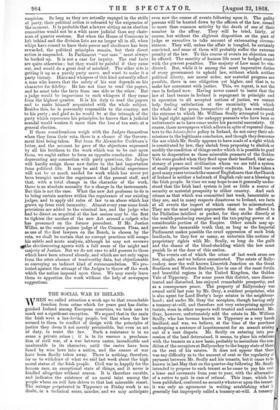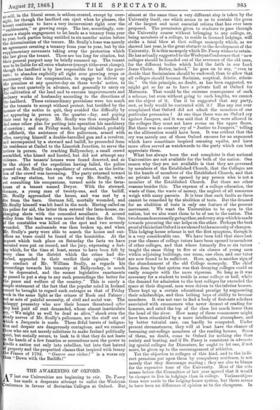THE SOCIAL WAR IN IRELAND. AV HEN we called attention a
week ago to that remarkable freedom from crime which for years past has distin- guished Ireland among European countries, we took care to mark out a significant exception. We argued that in the main the Irish were a law-loving people, but that when the law seemed to them to conflict of design with the principles of justice they deem it not merely permissible, but even an act of duty, to resist the law. Such a resistance is in no sense a private crime ; it is in its essence a proclama- tion of civil war, of a war between castes, ineradicable and unalterable in its character, until the castes have been fused by wise laws into a nation, and the causes of war have been finally taken away. There is nothing, therefore, for us to withdraw of what we said last week about the high moral status of the Irish people. Civil war is, happily for the human race, an exceptional state of things, and it never is kindled altogether without reason. It is therefore curable, and indicates the existence of no moral taint among the people whom an evil fate drives to that last miserable resort. The outrage perpetrated in Tipperary on Friday week is no doubt, in a technical sense, murder, and we may anticipate even now the course of events following upon it. The guilty persons will be hunted down by the officers of the law, roused to more than common activity by the death of one of their number in the affray. They will be tried, fairly, of course, but without the slightest disposition on the part of judge or executive to take account of extenuating circum- stances. They will, unless the affair is bungled, be certainly convicted, and some of them will probably suffer the extreme penalty of the law. To this course of events no objection can be offered. The sanctity of human life must be hedged round with the gravest penalties. The majesty of Law must be vin- dicated. But, while it is among the most imperative duties of every government to uphold law, without which neither political liberty, nor moral order, nor material progress are possible, there is one obligation yet higher, and that is, to make law consonant with justice. This, we repeat, is not the case in Ireland now. Having never ceased to insist that the law of land tenure in Ireland is repugnant in principle and in operation to all accepted notions of justice, we cannot help feeling satisfaction at the unanimity with which the whole of the press, irrespective of party, has condemned the extreme to which Mr. William Scully attempted to push his legal right against the unhappy peasants who have been so unfortunate as to have come under his parental suzerainty. Of course, those newspapers which adhere in spite of repeated disas- ters to the laissez-faire policy in Ireland, do not carry their ad- missions to the legitimate conclusion, and though they denounce the use which Mr. Scully appears to have made of a right which is constituted by law, they shrink from proposing to abolish or modify the condition of things under which it is possible to goad men to desperation as those miserable peasants of the Golden Vale were goaded when they fired upon their landlord, that mis- sionary of peace and civilization whom we are told a system of small properties would too surely eradicate. It has taken a good manyyears to teach the mass of Englishmen that the Church of Ireland is neither a bulwark of English rule nor a blessing to the Irish people. In time we may hope to see it generally under- stood that the Irish land system is just as little a source of security or material prosperity to either country. And such crimes as that which was committed last week, lamentable as they are, and in many respects disastrous to Ireland, are facts at all events the import of which cannot be misconstrued. They are the most cogent arguments that can be offered to the Philistine intellect or pocket, for they strike directly at the wealth-producing energies and the tax-paying power of a considerable portion of the Empire. Other minds may ap- preciate the inexorable truth that, so long as the Imperial Parliament makes possible the cruel oppression of such Irish landlords, be they few or many, as entertain like notions of proprietary rights with Mr. Scully, so long do the guilt and the shame of the blood-shedding which the law must punish lie at the door of this nation. The events out of which the crime of last week arose are few, simple, and we believe uncontested. The estate of Bally- coohey, near the well known Limerick Junction on the Great Southern and Western Railway, lies in one of the most fertile and beautiful regions in the United Kingdom, the Golden Vale of Tipperary. For some years this district, once discon- tented and disturbed, has enjoyed remarkable prosperity, and as a consequence peace. The property of Ballycoohey was owned until last year by Mr. Gray, a resident proprietor, who is also agent for Lord Derby's large estates in the neighbour- hood ; and under Mr. Gray the occupiers, though having only a tenancy-at-will, and therefore not very enterprising agricul- turists, were in other respects well treated and contented. Mr. Gray, however, unfortunately sold the estate to Mr. William Scully, who has become known in Tipperary as a very harsh landlord, and was, we believe, at the time of the purchase undergoing a sentence of imprisonment for an assault arising out of a rent dispute. Mr. Scully on entering into pos- session of the land determined, it seems, to place his relations with the tenants on a new basis, probably to assimilate the con- dition of the occupiers at Ballycoohey to the happy state of those on the rest of his estates. It does not appear that there was any difficulty as to the amount of rent or the regularity of payment between Mr. Scully and his tenants, but it came to be known in last May that on the quarter-day following Mr. Scully intended to propose to each tenant as he came to pay his rent a lease and covenants from year to year, with the alternative of a notice to quit in case of refusal. This lease, which has been published, conferred no security whatever upon the tenant: it was only an agreement in writing establishing what s generally but improperly called a tenancy-at-will. A tenancy. in the literal sense, is seldom created, except by over- sight, for though the landlord can eject when he pleases, the tenant continues to have a very inconvenient right over the "emblements," or growing crops. The law, accordingly, con- strues a simple engagement to let lands as a tenancy from year to year, both parties being entitled to six months' notice before the determination of the tenure. Mr. Scully's lease was merely an agreement creating a tenancy from year to year, but by the supplementary covenants taking away the protection which the law gives the tenant. These are too long for citation, but their general purport may be briefly summed up. The tenant was to be liable for all rates whatever (except tithe-rent charge), though the landlord is by law responsible for half the poor- rate; to abandon explicitly all right over growing crops or customary claim for compensation, to engage to deliver up the premises at any quarter-day on three weeks' notice, to y the rent quarterly in advance, and generally to carry on the cultivation of the land and to execute improvements and rdinary works of husbandry according to the directions of he landlord. These extraordinary provisions were too much for the tenants to accept without protest, but terrified by the menace of the notice to quit, they avoided the difficulty by not appearing in person on the quarter - day, and paying their rent by a deputy. Mr. Scully was thus compelled to find some other plan for putting into operation his machinery of coercion ; and on Friday week, having obtained, probably on affidavit, the assistance of five policemen, armed with rifles, carrying himself a double-barrelled grin and a revolver, and accompanied by a steward and bailiff, he proceeded from his residence at Cashel to the Limerick Junction, to serve the notices in person. On reaching Ballycoohey, a small crowd assembled, who hissed and hooted, but did not attempt any Tiolence. The tenants' houses were found deserted, and so far the object of the expedition having failed, the police pressed on Mr. Scully the expediency of retreat, as the irrita- tion of the crowd was increasing. The party returned toward the railway station, but on the way Mr. Scully, with- out consulting his companions, turned aside to the farm- house of a tenant named Dwyer. With the steward, Gorman, a young man of twenty-one, and the bailiff, r. Scully approached the house, and was met by a from the barn. Gorman fell, mortally wounded, and . Scully himself was hit hard in the neck. Having called on he police for aid, the latter then entered the farm-house, ex- hanging shots with the concealed assailants. A second olley from the barn was even more fatal than the first. One the constables was killed on the spot and two severely ounded. The ambuscade was then broken up, and when Scully's party were able to search the house and out- ffices no trace could be found of the homicides. At the quest which took place on Saturday the facts we have mated were put on record, and the jury, expressing a feel- g which, for the time at least, seems to have been felt by very class in the district which the crime had &B- arbed, appended to their verdict their opinion "that he conduct of Mr. William Scully, as regards his roceedings towards his tenantry at Ballycoohey, is much o be deprecated, and the sooner legislative enactments passed to put a stop to any such proceedings the better for he peace and welfare of the country." This is surely a maple statement of the fact that the popular mind in Ireland nnot be brought to regard such outrages as that of Friday eek in the same light as the crimes of Rush and Palmer ; ut as acts of painful necessity, of civil and social war. The happy peasantry who saw their homes threatened after ey had paid all rent demanded, whose almost inarticulate , "We might as well be dead as alive," shook even the y nerves of Mr. Scully's policemen, are the stuff out of Inch a Jacquerie is made. These fitful bursts of indigna- on and despair are dangerously contagious, and we counsel those who are not merely solicitous to make Ireland politically quiet, but socially secure, to look to it that they do not leave in the hands of a few fanatics or necessitous men the power to kindle a nation not only into rebellion, but into that hatred Of property and the propertied classes that inspired with frenzy the France of 1793. "Guerre aux riches ! " is a worse cry than "Down with the Bailiffs !"































 Previous page
Previous page